Swiss 'shock and horror' sparks currency war
A new currency war looms over markets in the wake of the Swiss National bank's shock decision to unpeg its currency from the euro.

Get the latest financial news, insights and expert analysis from our award-winning MoneyWeek team, to help you understand what really matters when it comes to your finances.
You are now subscribed
Your newsletter sign-up was successful
Want to add more newsletters?

Twice daily
MoneyWeek
Get the latest financial news, insights and expert analysis from our award-winning MoneyWeek team, to help you understand what really matters when it comes to your finances.

Four times a week
Look After My Bills
Sign up to our free money-saving newsletter, filled with the latest news and expert advice to help you find the best tips and deals for managing your bills. Start saving today!
Switzerland has a reputation for being safe and dull. Not now at least as far as investors go. Last Thursday, the Swiss central bank the Swiss National Bank (SNB) caused "a degree of shock and an equal amount of horror", as one banker puts it in the Financial Times. It ditched its efforts to keep the euro from weakening to below SFr1.20.
The franc jumped by more than 30% against the euro in minutes, a "terrifying swing for an established Western currency", says Allister Heath in The Daily Telegraph: they rarely move by more than 2%-3% a day.
It ended the day around 14% stronger, trading at near parity (one for one) with the euro, as the below chart shows. Swiss stocks dived 13%, with exporters leading. "Many fortunes were lost."
MoneyWeek
Subscribe to MoneyWeek today and get your first six magazine issues absolutely FREE

Sign up to Money Morning
Don't miss the latest investment and personal finances news, market analysis, plus money-saving tips with our free twice-daily newsletter
Don't miss the latest investment and personal finances news, market analysis, plus money-saving tips with our free twice-daily newsletter
From Russian oligarchs financing chalets to "average eastern Europeans, who took out mortgages in Swiss francs", investors had amassed huge bets on the Swiss exchange rate staying put, says Randall Forsyth in Barron's.
Some were carry traders, borrowing at rock-bottom interest rates in francs to buy higher-yielding assets elsewhere. Speculators who had borrowed heavily to back their bets lost their shirts. That hit brokers hard, such as Britain's Alpari.
Why now?
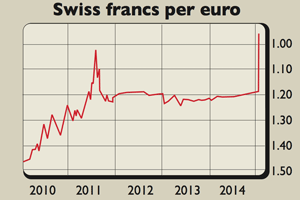
The Swiss, like the Germans, are "viscerally attached to the notion of a healthy' currency secure from perceived debasement risks", says Gavekal Dragonomics. The country recently held a referendum on forcing the central bank to own more gold. It failed, but that it occurred at all is telling.
Moreover, the value of the SNB's balance sheet has rocketed to 75% of GDP, "a ratio dwarfing that in other economies engaged in unconventional monetary stimulus", says the FT. SNB fears about European Central Bank (ECB) quantitative easing (QE) forcing more euros into Switzerland must have played a part too.
As the franc shot up, the SNB made losses on its euro holdings, but these might have been even worse later if ECB QE sent the euro plunging. "Already in a hole, the SNB may have decided to stop digging," said The Economist's Buttonwood blog.
What next?
Meanwhile, other central banks with exchange-rate targets have been forced to act too. Denmark, another safe haven with a euro peg, trimmed its key lending and bank deposit rates to eurozone levels. It probably won't stop there. The currency wars have moved to Europe.
The return to gold
Mounting expectations of European Central Bank quantitative easing (QE) have made gold "attractive as a hedge against a debasement of the currency", says Mitsubishi's Jonathan Butler it's already at a near-two-year high of €1,100 an ounce in euros.
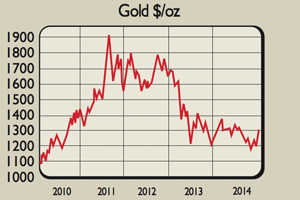
But don't get "carried away", warns Capital Economics. A return of global risk appetite aided by QE or a stabilising oil price would temper safe-haven flows, while US rates are still due to rise. Still, they are unlikely to rise fast and global bond yields should remain low amid growth and deflation fears. Demand from emerging-market central banks and consumers is rising. So there is scope, says Capital, for gold to hit $1,400 by year end.
Get the latest financial news, insights and expert analysis from our award-winning MoneyWeek team, to help you understand what really matters when it comes to your finances.

-
 Should you buy an active ETF?
Should you buy an active ETF?ETFs are often mischaracterised as passive products, but they can be a convenient way to add active management to your portfolio
-
 Power up your pension before 5 April – easy ways to save before the tax year end
Power up your pension before 5 April – easy ways to save before the tax year endWith the end of the tax year looming, pension savers currently have a window to review and maximise what’s going into their retirement funds – we look at how
-
 How have central banks evolved in the last century – and are they still fit for purpose?
How have central banks evolved in the last century – and are they still fit for purpose?The rise to power and dominance of the central banks has been a key theme in MoneyWeek in its 25 years. Has their rule been benign?
-
 Do we need central banks, or is it time to privatise money?
Do we need central banks, or is it time to privatise money?Analysis Free banking is one alternative to central banks, but would switching to a radical new system be worth the risk?
-
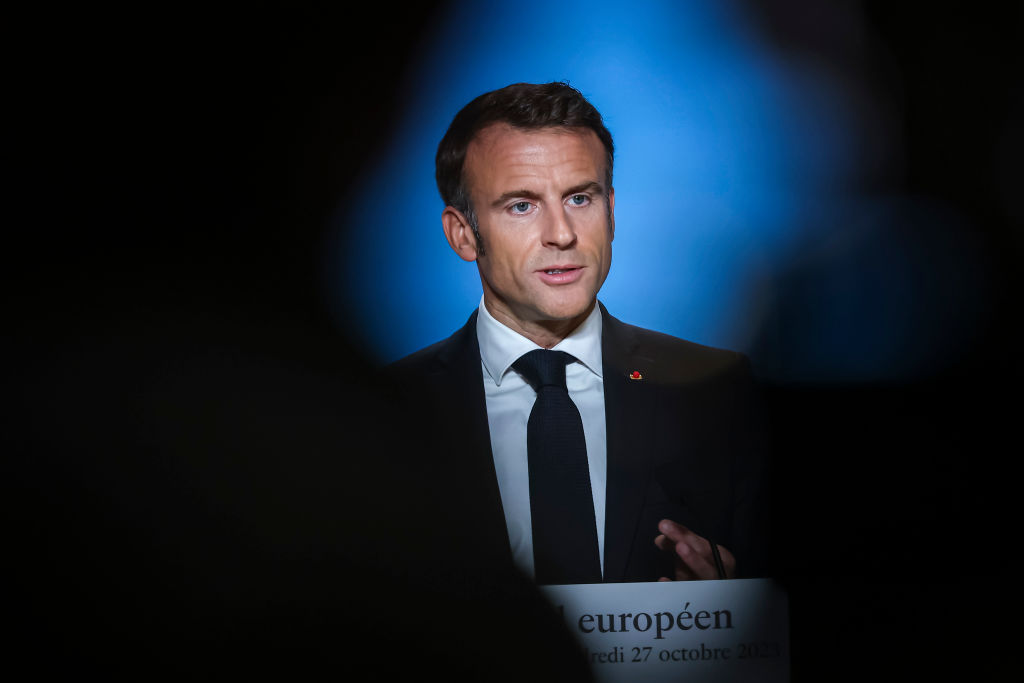 The French economy's Macron bubble is bursting
The French economy's Macron bubble is burstingCheap debt and a luxury boom have flattered the French economy. That streak of luck is running out.
-
 The Bank of England can’t afford to hike interest rates again
The Bank of England can’t afford to hike interest rates againWith inflation falling, the cost of borrowing rising and the economy heading into an election year, the Bank of England can’t afford to increase interest rates again.
-
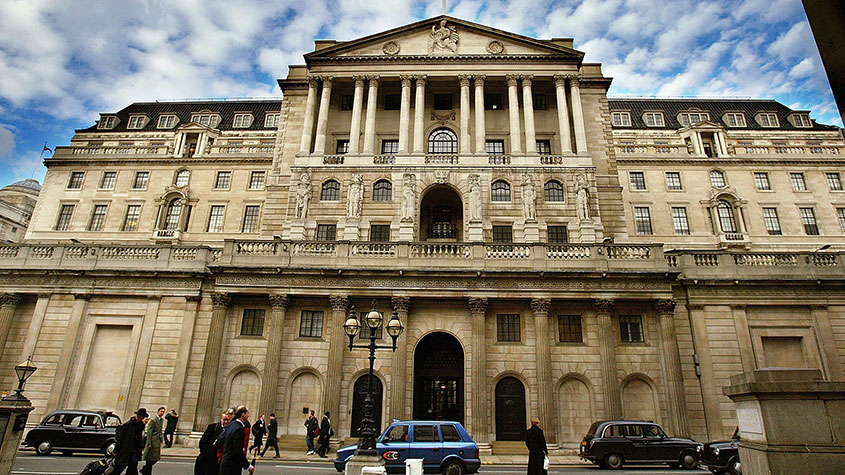 Bank of England raises interest rate by 0.5%
Bank of England raises interest rate by 0.5%News The Bank of England has raised interest rates once again, this time by 0.5%. This takes the bank’s base rate to 3.5%, the highest it’s been since 2008.
-
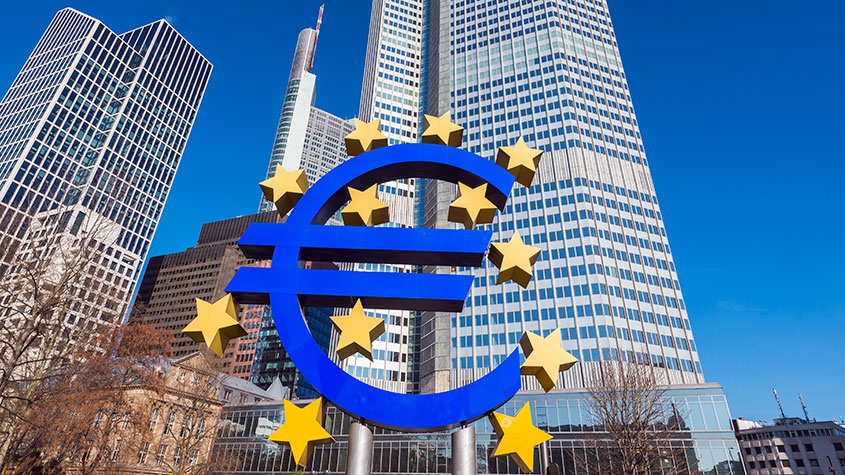 Eurozone inflation hits 10.7% in October
Eurozone inflation hits 10.7% in OctoberNews Inflation across the eurozone hit 10.7% in October. What does it mean for your money?
-
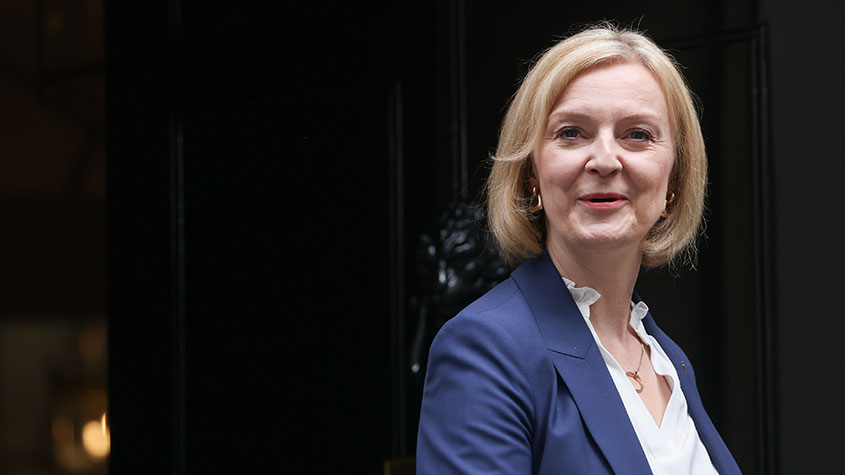 A forgotten lesson on the dangers of energy price caps
A forgotten lesson on the dangers of energy price capsAnalysis Liz Truss’s proposed energy price cap is an ambitious gamble. But a similar programme in Spain ended up being a fiasco, say Max King and Tom Murley. Here, they explain why Truss’s plan could be doomed to failure.
-
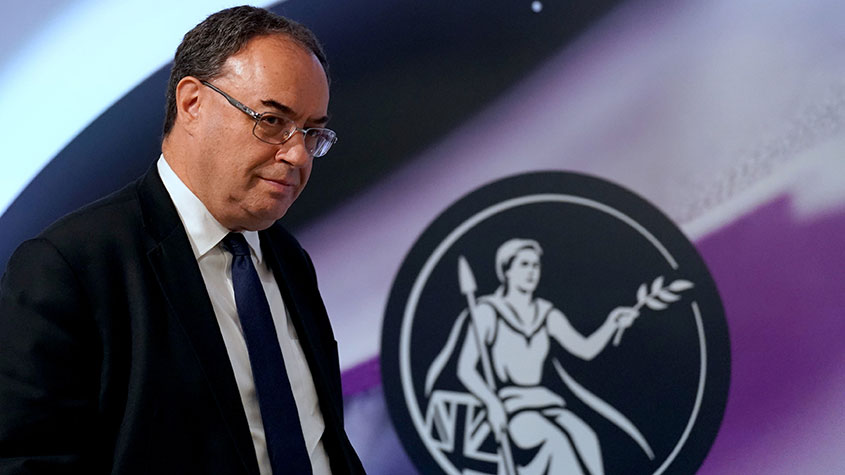 Central banks can’t solve our current economic problems
Central banks can’t solve our current economic problemsAnalysis Traditionally, as we hit recessionary times, central banks have lowered interest rates. But that’s not an option this time. If anyone can help dull the economic pain, it’s not the Bank of England, it’s the government. John Stepek explains why.